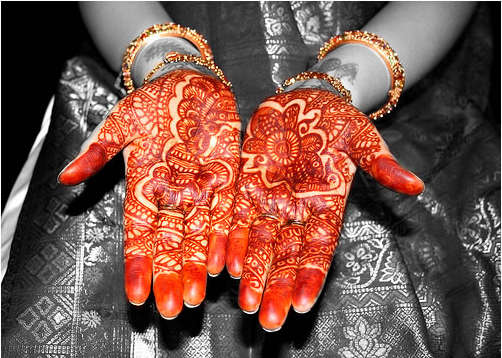FWP:
SETS == GROTESQUERIE; IDIOMS
GRANDIOSITY: {5,3}
HENNA:
{18,4}
IDOL: {8,1}
Compared to Bekhud Dihlavi's more directly physical connection, how bland is Nazm's and Bekhud Mohani's notion that the beautiful ones merely stopped using henna in grief after the lover's death! Bekhud Dihlavi not only makes the obvious equation between the colors (henna is red like blood), but also links the two substances themselves. The beloved used to use the lover's blood as 'henna' (for longer-lasting color? for enhanced radiance? for kinky satisfaction?); now that the lover is gone she's deprived of the chance to do this.
The argument can even be pushed a step further, for Ghalib expressly says that it's the beautiful ones' fingernails that lack henna after the speaker is gone. For more on henna, see {18,4}. Henna is normally applied to the palm of the hand and the fingers, so why emphasize the nails? Obviously because the beloved enjoyed actually handling the lover's bloody heart, and even scratching or gouging it with her nails, so that her nails in particular were adorned with the lover's blood, in lieu of henna. This kind of thing is characteristic of the beloved, after all; to take just a couple of examples, she enjoys holding a hundred hearts in her hand, as in {8,1}; and she enjoys watching the writhing of her wounded, stricken prey, as in {8,3}.
Moreover, when the lover realizes the beloved's deprived condition, even in the dust his heart turns to blood for her. This is an elegant 'concretization' of a conventional idiomatic phrase. Usually someone's 'heart turns to blood' with grief, which is quite appropriate here for the lover's intense sympathy and sorrow on the beloved's behalf. But even more aptly, since it's the lover's blood that the beloved lacks, even when the lover is dust his heart somehow, seeking to fulfill her every need, manages to turn to the blood that she requires. As usual, Ghalib has used the idiom in both the colloquial and the literal sense.
The pluralization of 'idols' goes with the general emphasis of this ghazal on the lover's death as a cosmic event affecting not only all beautiful women, but even passion itself. On dead-lover-speaks verses, see {57,1}.
Note for grammar fans: a;hvaal is of
course the plural of ;haal , but it's treated as singular
so consistently that Platts makes a special note of the fact (see the definition
above). Other verses in which a;hvaal is clearly treated
as singular: {92,8x}, {134,2}.
For a converse case, consider ma((nii , which is singular
but is always treated as plural; see {175,6}
for an example.

Nazm:
That is, in mourning for me they left off using henna. 'Dust' refers to the dust of the grave. (52)
== Nazm page 52